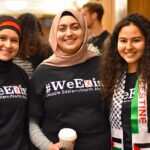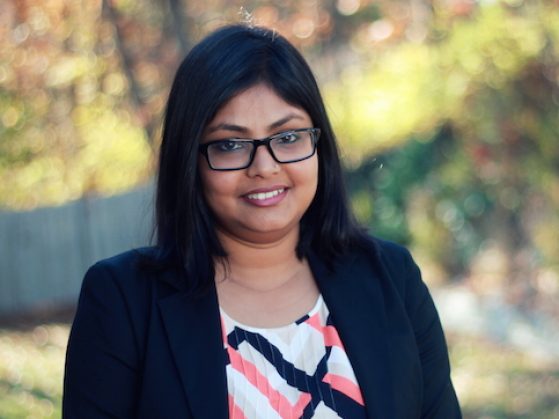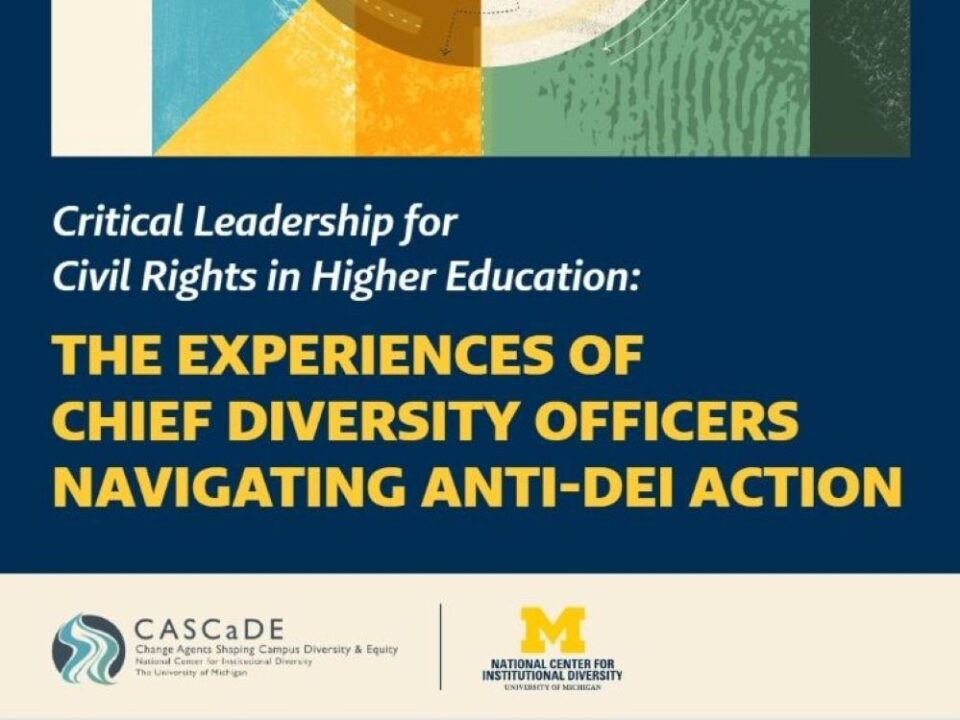- About
- News
- Events
- Initiatives
- Anti-Racism Collaborative
- Change Agents Shaping Campus Diversity and Equity (CASCaDE)
- Diversity Scholars Network
- Inclusive History Project
- James S. Jackson Distinguished Career Award for Diversity Scholarship
- LSA Collegiate Fellowship Program
- University Diversity & Social Transformation Professorship
- Publications & Resources
- About
- News
- Events
- Initiatives
- Anti-Racism Collaborative
- Change Agents Shaping Campus Diversity and Equity (CASCaDE)
- Diversity Scholars Network
- Inclusive History Project
- James S. Jackson Distinguished Career Award for Diversity Scholarship
- LSA Collegiate Fellowship Program
- University Diversity & Social Transformation Professorship
- Publications & Resources

NCID Announces 2019 ‘Think-Act Tanks’
March 4, 2019
NCID Establishes Four New Knowledge Communities
March 19, 2019Scholar Story: Urmitapa Dutta
"Often when there is a lot of violence, it's very easy to categorize it as exceptional. But I wanted to look at how things that we consider fragmented are actually part of what's been going on for a really long time."
Violence is probably the most obvious and visible form of oppression. From domestic violence and child abuse, to bullying and sexual assault, violence continues to be a constant crisis within human society. Many times when there is constant violence it becomes easy for people to categorize the violence as exceptional, extraordinary, or not the norm. But according to Urmitapa Dutta, an associate professor at the University of Massachusetts Lowell, the violence that we consider isolated incidences are actually part of what's been going on for a really long time.

I caught up with Dr. Dutta to talk about her scholarship. Through her scholarship, she aims to interrogate everyday violence (i.e., forms of direct, structural, and symbolic violence) that has become endemic to society, and to develop community-engaged interventions that address it.
This interview has been edited for clarity and length.
Tell me a little about your book chapter, The Everyday and the Exceptional: Rethinking Gendered Violence and Human Rights in Garo Hills, India.
It's basically looking at gendered violence in the context of ethnic conflict in the Garos region of northeast India. This work grew out of my larger ethnographic work, which is really looking at the different forms of ethnic conflict, the configurations of othering and marginality that takes place in that context, but sort of centering the perspectives of ordinary people as they go about their daily lives. I had drawn upon multiple stakeholders to really look at how does violence play out and what are the forms of violence and oppression that get normalized and are no longer questioned.
It became particularly important for me to capture women's perspectives. So what would the gender-based forms of gender-based oppression and violence that women experience and how do they understand those forms of violence within the broader context of ethnic conflict. That was really the focus of my research. And what was sort of distinct about it was that it was really important for me to not just amplify women's voices, but really think about how can we draw on their lived experiences and their analysis.
What did you learn from your study?
During the time that I was doing this field work, there was extreme violence in the Garo Hills region—the peak of ethnic violence in that region so far. Along with frequent occurrence of extortion, abduction, armed violence, and a heavy military presence, there were certain incidents that sent shockwaves through the region. These included custodial deaths, torture and abuse of trafficked adolescent girls in the guise of moral cleansing, and the sexual assault and killing of a woman by armed insurgents. I used those “crisis” incidents as a way to look at public discourse and engagement around gender-based violence, but also to engage Garo women to help understand some of what was going on.
And then talking to the women, what they highlighted was that they really focused on the fundamental heterogeneity of violence against women. They talked about the entire spectrum of violence that takes place. Economic exploitation, forced labor, the ways in which various kinship practices are often used to involve women in sex trade, the absence of any kind of resources, safe houses, alternative employments, no health care facilities following a sexual assault or after women are trafficked. Then they talked about the broader social cultural structure within which women are marginalized. And again the ways in which customary practices are used primarily by men to then oppress women or silence their concerns. They talked about domestic violence.
What was really powerful was that they connected all of those and showed how these instances of sexual violence that takes place within the larger context of conflict is not a discrete category of violence. But that they are both extensions of what's already happening and they also end up reinforcing the forms of inequality and oppression that already exist. Often when there is a lot of violence, it's very easy to categorize it as exceptional. But I wanted to look at how things that we consider fragmented are actually part of what's been going on for a really long time.
I think that was really powerful, and sort of highlighting how far women who occupy these margins — whether they're in cultural margins, or margins of the nation state — that the kinds of everyday violence that they experience are not irreducible to any one single category. So that was really key. What it highlighted was the importance of thinking about both gendered violence as well as women's human rights from those perspectives, in ways that do not simply try to categorize women's experiences into different categories of violence.
What prompted you to examine this line of research?
I think the strongest influence has been my own lived experience. I was born and raised in northeast India. What's really interesting about this region is it consists of seven states, but almost 98% of this region consists of international boundaries. When I travelled there, I saw the ways in which people from that region and the issues they face are often dismissed or silenced, facing preconceptions like the region being remote, people who live there are uncivilized, and that it's dangerous. It became very evident to me that there was this gap between representations, from the news media, public policy, and the experiences of people on the ground.
It really sensitized me to the different forms of marginality and exclusion that people experience, and identity categories or citizenship categories are often not adequate to capture those lived experiences. All of those really shaped my research trajectory and then I moved to the US for my PhD in 2006 and once I came here, very quickly I became cognizant of the politics around knowledge construction. In terms of what gets considered legitimate knowledge, who was authorized to construct knowledge, but there are all of these politics, and as a woman of color, who is from the global south and who is very committed to doing research there, in many ways my work would get labeled as a case study, as opposed to more general or generalizable work that's taking place in the US.
The other kinds of questions that were also raised were, Was it rigorous given my involvement and investment in the issues that I was studying? Those experiences really inspired me to begin to challenge the ways in which we think about knowledge, what constitutes rigorous research, and to bring in more marginalized and underrepresented perspectives. It also made me really committed to developing more alternative theoretical and methodological frameworks.
What are some key points you want readers to take away from your work?
First, we need to broaden our understanding of what constitutes violence. Violence is never just one kind of violence and it extends beyond direct physical violence. When you have all these systems and structures that are constructed in such a way, they perpetuate and legitimize inequality. So unless we begin to interrogate and confront those structures, we will never get to the root cause of the problem. Anything that we do will end up being temporary fixes.
Second, I really impress upon the importance of centering and foregrounding the standpoint of people who are most marginalized by a particular issue. Based on my scholarship, it is my understanding that whether it's in terms of theorizing, looking at research methods, or even thinking about policy or action, that it must be framed and it must be influenced based on the perspectives of those who are most affected by that. That's where our work should come from.
Third, centering stories is important. I think that is something that the #metoo movement has particularly shown us, the power of stories, and particularly when those stories come together in solidarity when the collective narrative begins to emerge. That can have a lot of power in terms of social transformation. Bringing these women's stories together in my research really helped disrupt the silence that was there within the broader public narrative. I think that is really important.
Are you interested in Dr. Dutta’s work? Feel free to reach out to her. She interested in working with other people who are trying to shift the contours of knowledge production and thinking about the ways in which to challenge Eurocentric forms of different theories or methods which are often considered the cannons. In addition, Dr. Dutta is interested in working with scholars on topics around migration and gender-based violence and the ways in which we can work alongside communities and building solidarities. Visit Dr. Dutta’s profile here.




